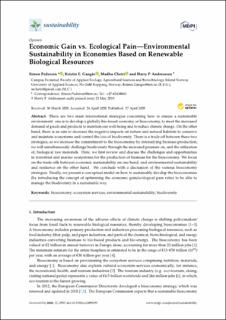Economic Gain vs. Ecological Pain—Environmental Sustainability in Economies Based on Renewable Biological Resources
Peer reviewed, Journal article
Published version
Permanent lenke
https://hdl.handle.net/11250/2763410Utgivelsesdato
2020Metadata
Vis full innførselSamlinger
Sammendrag
There are two main international strategies concerning how to ensure a sustainable environment: one is to develop a globally bio-based economy, or bioeconomy, to meet the increased demand of goods and products to maintain our well-being and to reduce climate change. On the other hand, there is an aim to decrease the negative impacts on nature and natural habitats to conserve and maintain ecosystems and control the loss of biodiversity. There is a trade-off between these two strategies; as we increase the commitment to the bioeconomy by intensifying biomass production, we will simultaneously challenge biodiversity through the increased pressure on, and the utilization of, biological raw materials. Here, we first review and discuss the challenges and opportunities in terrestrial and marine ecosystems for the production of biomass for the bioeconomy. We focus on the trade-offs between economic sustainability on one hand, and environmental sustainability and resilience on the other hand. We conclude with a discussion of the various bioeconomy strategies. Finally, we present a conceptual model on how to sustainably develop the bioeconomies (by introducing the concept of optimizing the economic gain/ecological pain ratio) to be able to manage the biodiversity in a sustainable way.

